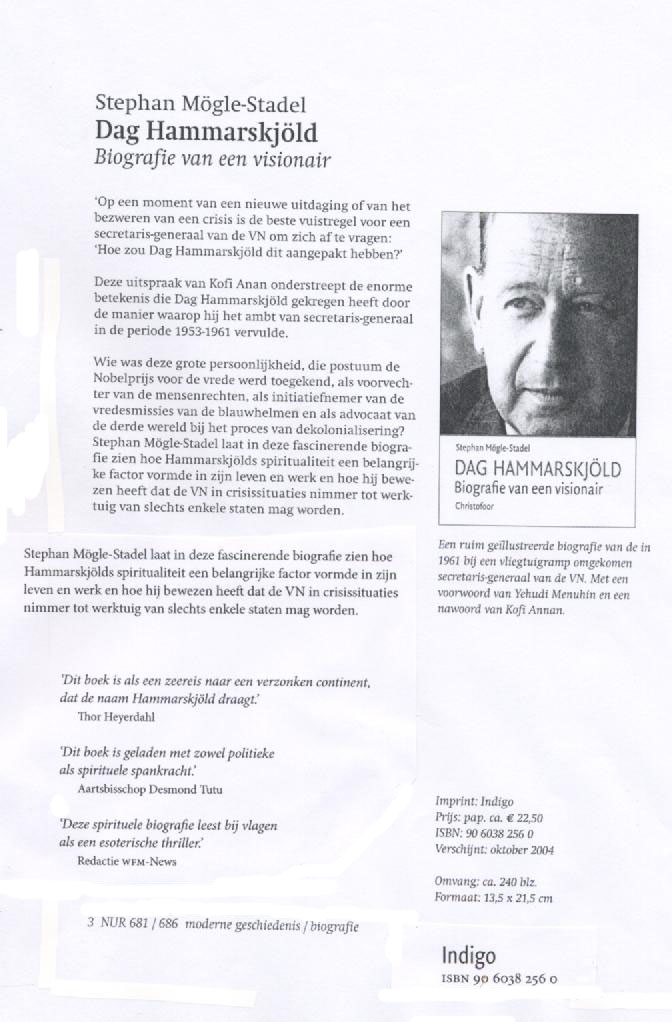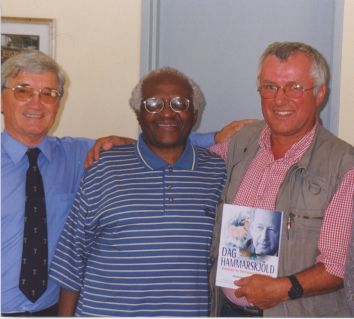
| English Biographie Bücher Freundeskreis Veranstaltungen Weltpolitik Fotos |
| Presse Tagebuch Studienreisen Reden Shop Gastbeiträge Institut Spende |
Warum wurde ein Mord totgeschwiegen?
Vierte, überarbeitete Auflage!
Mit aktuellem Nachwort von Kofi Annan
 1961
starb UN-Generalsekretär Dag Hammarskjöld bei einem Attentat.
Wer war dieser Mann, dem der Friedensnobelpreis posthum verliehen wurde
- als Menschenrechtler, Initiator der UN-Blauhelmtruppen und als Anwalt
der Dritten Welt im Prozess der Entkolonialisierung? Ein Kosmopolit,
der 1960 über 20.000 UNO-Soldaten aufbot, um den Völkermord
im Kongo zu stoppen. Ein Mensch, dem die damaligen Vertreter der UdSSR
vorwarfen, er benehme sich wie der Ministerpräsident einer Weltbürgerregierung.
1961
starb UN-Generalsekretär Dag Hammarskjöld bei einem Attentat.
Wer war dieser Mann, dem der Friedensnobelpreis posthum verliehen wurde
- als Menschenrechtler, Initiator der UN-Blauhelmtruppen und als Anwalt
der Dritten Welt im Prozess der Entkolonialisierung? Ein Kosmopolit,
der 1960 über 20.000 UNO-Soldaten aufbot, um den Völkermord
im Kongo zu stoppen. Ein Mensch, dem die damaligen Vertreter der UdSSR
vorwarfen, er benehme sich wie der Ministerpräsident einer Weltbürgerregierung.
"Hammarskjöld ist für mich
eine Persönlichkeit von hervorragender Bedeutung. Es gibt keine
bessere Regel als zu fragen: wie hätte es Dag Hammarskjöld
bewerkstelligt?"
UN-Generalsekretär Kofi Annan.
Ein Mensch, der die Weltmächte in ihre Schranken verwies!
Wer weiß schon wie ein Staatsmann
aussehen muss, der nicht zwischen und nicht in, sondern über den
Nationen steht?
Gösta v. Uexkull in der ZEIT unter
dem Titel "Kosmopolitiker Hammarskjöld"
Dieses Buch ist wie die Seereise zu
einem versunkenen Kontinent,
der den Namen Hammarskjöld trägt.
Dr. Thor Heyerdhal, Archäologe und
Bestsellerautor
Ihr Buch birgt politische wie auch
spirituelle Sprengkraft.
Erzbischof Desmond Tutu, Friedensnobelpreisträger
Es gibt Leute in der internationalen
Bürokratie, die
meinen werden, dass dieses Buch verboten gehört.
Dr. Robert Muller, UN Assistant Secretary
General a.D.
Lieber Freund, ich war sehr bewegt
von Deinem
Buchmanuskript über Dag Hammarskjöld.
Aus dem Geleitwort von Lord Yehudi Menuhin
Besuchen Sie das Dag-Hammarskjöld-Institut
im Internet: www.hammarskjoeld-institut.info.ms
Stephan Mögle-Stadel: Dag Hammarskjöld. Vision einer Menschheitsethik
Mit einem Vorwort von Lord Yehudi Menuhin und einem aktuellem Nachwort
von Kofi Annan
255 Seiten, 36 Fotos, kartoniert, Verlag Urachhaus
€ 13,50 (D) / sFr 23,60 o ISBN 3-8251-7432-8
Lizenzanfragen und Informationen zu einer Studienreise
mit dem Autor im August nach Schweden über Pressebüro-Globe
Der Autor steht für Lesungen und Dia-Vorträge zu Verfügung.
DAG HAMMARSKJÖLD:
BREAKING THE DEATHLY SILENCE
On 17 September 1969 Dag Hammarskjöld died in a
mysterious plane crash near Ndola in Zambia (the northern Rhodesia).
In hindsight the Swede, born in 1905, appears to have been a beacon
of light in an otherwise murky morass of international post-war politics.
He remains so far the only person to receive the Nobel Peace Prize posthumously- as an upholder of human rights, the initiator of UN-peace troops, an advocate for the Third World during the process of de- colonisation. After the publication of his diary `Markings´, that took the world by storm, professional obituary writers had to re-assess Dag Hammarskjöld's legacy. In it Dag Hammarskjöld revealed himself to be a modern day visionary, whose holistic and progressive political vision of a new ethic for humanity formed the basis of all his actions- until he fell victim to an insidious plot designed by western secret services in cahoots with an international mining company with its headquarters in Brussels.
Stephan Mögle-Stadel began in 1994 to decipher Hammarskjöld's esoteric life-work. With the help of hitherto unpublished material and conversations with former co-workers he succeeded in unraveling the background of the plot of 1961. He also succeeded in tracing Hammarskjöld's path of inner development, relating to his public offices and activities. A still tangible reminder of these activities is the meditation room in the UN building in New York designed by him and executed by his artist friend Bo Beskow.
ABOUT THE AUTHOR
Stephan Mögle Stadel (1965- ) is a journalist
and publishing consultant. He studied history and psychology and furthered
his studies at the C.G. Jung-Institute for Depth psychology. He is a
member of the Erich Fromm society for Social Psychology. He also worked
for a research organisation linked to the Club of Rome from1996 to 1998.
In 1990 he was correspondent in New York and a probationer at the United
Nations in 1992. From 1993 to 1999 he was chair of the German section
of WFM-International, a pressure group a.o. for the establishing of
an International Court of Law for Crimes against Humanity (Rome-conference
1998).
Stephan has written a book a book about UN Secretary General Kofi Annan
titled
UNfinished Way - the UN in the 21. Century.
REVIEWS AND COMMENTS ON THE BOOK
| "His accomplishments, his innovations,
and his vision are a great inspiration... to uphold the standards he put into place." BOUTROS-GHALI, Secretary-General, source: speach on 18. Sept. 1996 |
" His life and his death, his words
and his actions, have done more to shape public expectations of the
office, and indeed of the Organisation, than those of any other man
or woman in history. His wisdom and his modesty, his unimpeachable integrity
and single-minded devotion to duty, have set a standard for all servants
of the international community- and especially of course for his successors-
ethic is simply impossible to live up to. There can be no better rule
of thumb for a Secretary-General, as he approaches each new challenge
and crisis, than to ask himself, "how would Hammarskjöld have
handled this?"...
What is clear is that his core ideas remain highly relevant in this
new international context."
KOFI ANNAN - Secretary-General of the UN.
On September 6 2001 in Uppsala, Sweden ("Dag Hammarskjöld
and the 21st Century")
" Dear Friend, I was very moved by the
manuscript about Dag Hammarskjöld. ...We have to overcome Nationalism
in all its forms. Nationalism is unable to solve any problems; it is
the problem- it poisons the people of the earth."
(the late) YEHUDI MENUHIN-violin virtuoso, conductor and music-teacher
in letter to the author
" There are persons in international
administration who believe the book should be impounded."
DR. ROBERT MULLER - former UN Assistant Secretary General.
" Who knows what a statesman should
look like, a statesman neither exisiting between nor within but above
the nations. We are familiar with the national statesman and also with
the cosmopolitan, but we do not know the cosmopolitician."
GÖSTA VON UEXKÜLL - Journalist and writer, published in the
German weekly newspaper DIE ZEIT, 15. November 1956.

Bestelling NL: Fax 030 - 69 14 834
Bestellung Deutschland: presse@hammarskjoeld.org
Preis inkl. Versandkosten 25 Euro
